#polycule drama of the early 1900s
Explore tagged Tumblr posts
Text
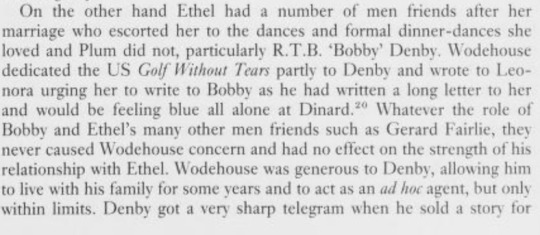

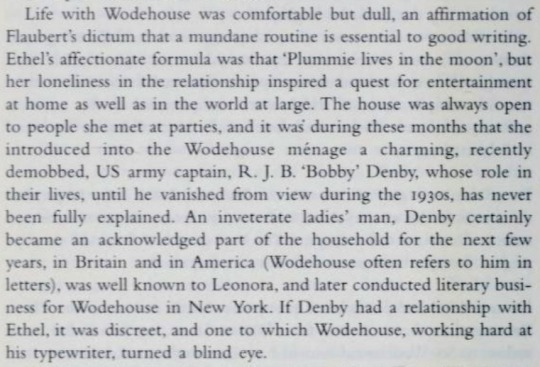
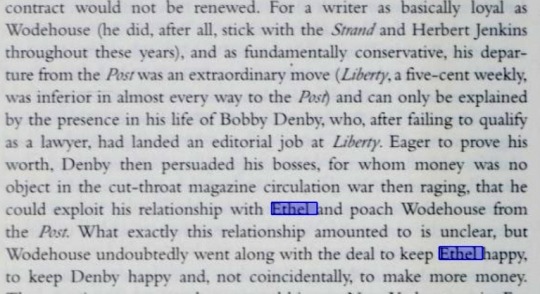
I'm actually starting to believe that Baxter may have become Wodehouse's way of venting a little bit about one of his wife's young men who was getting particularly irritating and officious, because as I've mentioned before, that guy existed in real life, his name was Bobby Denby, and Baxter never appeared again after Denby finally faded away for good in the 1930s and 40s.
The timeline is important here: Baxter predates Denby, with his first appearance being in 1915's Something Fresh. But his role is quite different there: he's essentially a well-meaning man trying to do his job, and at the end he's vindicated and restored to Lord Emsworth's good graces. In 1921, Denby shows up and joins the Wodehouse household, where he remains off and on for over a decade. In 1923, after a few attempts at creating a humorous earl's family with an overbearing sister, Wodehouse finally returns to Blandings and introduces the sister character who sticks, in the form of Lady Constance Keeble. Who in this first book does have an actual husband attached--Joe Keeble, like Wodehouse, has a beloved stepdaughter, and immediately after marrying, he turned his bank account over to his wife exactly as Wodehouse claims to have done (although his biographers feel this may have been an obfuscating piece of fiction). In later stories, the cast was pared down, and she and Lord Emsworth play out a number of takes on Wodehouse being pressured by his wife to socialize, wear formal clothes, do anything besides talk about his hyperfixation, and so forth. In essence, she becomes the wife figure to Lord Emsworth, with perhaps a bonus for Wodehouse in that this excludes any possible presumption by the readers that the characters are having sex.
Concurrently with Lady Constance's introduction, Baxter is, for the first time, an overbearing figure and enemy to Lord Emsworth's way of life. Most crucially, we see from their first scene that Lady Constance dotes on him and is an essential part of maintaining his power over Lord Emsworth. They feed off each other, with Baxter performing the hour-to-hour micromanagement and repairing to Lady Constance as enforcer whenever Lord Emsworth tries to assert himself. In Something Fresh he was acting to protect (what he assumed was) Lord Emsworth's property, with some justifiable personal investment in the Blandings museum, which Lord Emsworth happily left in his care. In Leave it to Psmith, he's setting Lord Emsworth's schedule and making him do things he hates. He "suggests" to Lady Constance that Lord Emsworth should go to meet one of her guests in London while the weather is nice at Blandings. Then when Lord Emsworth protests, Baxter counters that he couldn't possibly take responsibility for canceling the trip. Lord Emsworth would have to take it up with Lady Constance! In Summer Lightning and The Crime Wave At Blandings, we see the same repeating pattern of Lady Constance (sharing some traits with Ethel Wodehouse) trying to reintroduce him as a fixture in the household, where he threatens to plague the life out of Lord Emsworth, with whom Wodehouse himself identified the most out of any of his characters. In his final appearance, 1939's Uncle Fred in the Springtime, he's only there visiting with his new employer, and by all accounts, Denby had basically faded out of the Wodehouse household by then.
Now, obviously this isn't a one to one match; Wodehouse was happily married, whereas Lord Emsworth and Lady Constance are siblings who basically hate each other, and while Wodehouse admitted to hating all the same responsibilities Lord Emsworth hates, he clearly had a sense of humor about Lord Emsworth's total lack of interest in playing the host, reading his mail, or doing any of his duties as an earl. He understands that Lady Constance is tasked with a lot in keeping the household up to snuff, and that Baxter is perfectly capable of thriving under a more conventional employer. All I'm suggesting is that Wodehouse may have been drawing on certain minor frustrations when he was crafting these storylines, and that if so, we can make sense out of Lady Constance's attitude toward Baxter. From Summer Lightning on, she is indistinguishable from a woman in love, but there's no acknowledgment in the text that her behavior is odd in any way. She is not textually in love, but neither is it ever said that she thinks of him as a son, or a close platonic friend. If she were a man in her forties being described as "a devoted admirer" of a young female employee, and moreover, making repeated desperate attempts to get her back into his home on a permanent basis, there would be little question of what's going on. If it were genuinely platonic, we would have to be reassured of that in the text, and probably other characters would still make assumptions about their relationship. But Lady Constance's nearest and dearest have no reaction to Lady Constance announcing, "I shall never feel easy in my mind until Mr. Baxter is back in his old place," or, "Mr. Baxter was the most wonderfully capable man I ever met." When she turns scarlet upon hearing him insulted, nobody sees this as strange, even though he's a mere former employee whom she knew for eighteen months, during which time she was married. There's nothing questionable about her speaking to him alone in her boudoir, as happens on several occasions.
Now, in A Damsel in Distress (1919), we see an earlier form of the eventual Blandings ensemble, slightly refined from their actual first appearances in Something Fresh. Lord Marshmoreton is bossed around by his sister Lady Caroline, whereas Lord Emsworth would not acquire Lady Constance until Leave it to Psmith in 1923. Lord Marshmoreton is also afflicted by an efficient, bespectacled secretary, in his case one Alice Faraday. Alice considers Lady Caroline an ally in corralling Lord Marshmoreton, but they have no close relationship, and she later doubts whether Lady Caroline has spoken to her directly even a dozen times. Once Alice is safely married off to his step-nephew (long story), Lord Marshmoreton immediately moves to install a more agreeable secretary: Billie Dore, a sensible young actress who shares his passion for roses and gardening. And in this case, there's certainly an ulterior motive in his wish to have a certain young person under his roof: they too end up married by the end of the book. In The Small Bachelor, Mrs. Waddington (yet another of Wodehouse's formidable stepmother characters!) has one Lord Hunstanton as a sort of pseudo-Baxter: he's a young man she keeps around the household because she admires his title and upper class English manners. He, meanwhile, is one of Wodehouse's dude characters--the Waddington family means free meals, so he's happy to hang about, impressing their guests and serving as a general ornament. He and Mrs. Waddington are not having an affair, but the text addresses what people are liable to assume. At the climax of the story, Mrs. Waddington and Lord Hunstanton are discovered locked in an apartment together, after a standard Wodehousean scheme-gone-wrong. Despite their innocence, the rest of the cast comes to certain conclusions, and because it's a 1920s comedy, they can't argue their way out of it. There's no acceptable reason for an unmarried man and woman to be alone in a room together. This is the tool Wodehouse uses to end Mrs. Waddington's tyranny over her stepdaughter and the main hero. She can no longer stand in the way of their marriage. Her outraged husband finally seizes authority of the household, and dismisses Lord Hunstanton from said household--though in passing, it doesn't seem like Mr. Waddington ever suspected any infidelity before this. Mrs. Waddington's attitude towards Lord Hunstanton was never remarkably affectionate.
So as far as I can tell, Baxter and Lady Constance are unique among all the cross-sex relationships in Wodehouse. There are others with similar constructions, but only in this case is the relationship one of such intensity, only in this case does it recur through several stories, and only in this case is there such an unspoken assumption that absolutely no one has reason to suspect anything. In part this is because younger men are not expected to pursue older women. Women are considered to have a sell-by date; fictional men are not generally considered targets to be pursued by a viewpoint character, and if they are, then that viewpoint is presumed to be a young woman. And in the case of Baxter and Lady Constance specifically, they exist in order to be the disapproving forces who prevent cross-class relationships from happening. They're too strict and censorious for the audience to think they could be having a physical affair behind the scenes. Even if Baxter didn't show interest in "Myra Schoonmaker", proving that he has his sights set on a suitable marriage, it would just be impossible for these characters to imagine such a thing.
But it is possible that they could have a romantic interest in one another. Baxter is self-involved to the extreme; he does not fall in love at first sight in the way Wodehouse's wholesome young men do; but he is capable of thoughts that are "softer", as we are told objectively by the narrator, and looks that are, at least in intention, "admiring, almost loving". This on the basis of several hours' acquaintance with the false Miss Schoonmaker. So it's not out of the question that he could feel something for the woman who provokes the vast majority of his positive feelings in canon. It's very rare that Baxter--at least when we see him--is feeling anything but suspicious or irritated, but in those few moments where he approves of something or is said to be gladdened or feeling relief, it's related to Lady Constance.
(Incidentally, the other individuals who prompt positive feelings are Eve Halliday (briefly considers her pretty), the undercover detective in Leave it to Psmith (considers her reliable), J. Horace Jevons ("this golden-hearted Chicagoan"), Sue Brown ('nuff said), and, surprisingly, Uncle Fred, Pongo and Polly, whom he evaluates as pleasant and pretty, respectively, before their true menace is revealed.)
So why is this possibility never, ever questioned by anyone? These are two deeply snobbish people separated by class and (lack of) wealth. Lady Constance marries two commoners, but they're both multi-millionaires, which Baxter is not. Rupert Baxter the character would certainly want heirs to his name that Lady Constance can no longer provide, and no doubt his instincts as a secretary would revolt at jeopardizing his career by marrying a former employer's sister. There's also the fact that they've already spent eighteen months under the same roof, and she was married to someone else the entire time. Even today, that fact would excite comment if they later became involved.
But why is it so completely impossible that there might be even a one-sided interest between them? Why is it not even seen as worthy of debunking within the story? The closest we get is Baxter's interest in Sue Brown, whom he marks down as the future Mrs Baxter shortly after his friendship with Lady Constance is really developed on screen. But still, we are not told, "There was nothing between him and Lady Constance, and there never would be, because they saw each other as [fill in the platonic blank]."
To my mind, the best explanation is that they were modeled off a relationship where no form of sex or exclusive relationship was ever on the table to begin with. Ethel Wodehouse's young men were there for flirting and company at social events, no more. Denby was the only one who stayed around for very long. So what does Lady Constance want from Baxter, aside from doing his job? Why is it so important, during that stretch between Leave it to Psmith and The Crime Wave at Blandings, that he and no one else should be Lord Emsworth's secretary? She wants him around to dote on and gush over, with the assurance that they have a special kind of relationship he shares with no one else; more intense than a patron and her protege, but not an outright romance. It's a crush that can be indulged because there is no possibility of anything more, because those were the terms Wodehouse accepted in his own marriage.
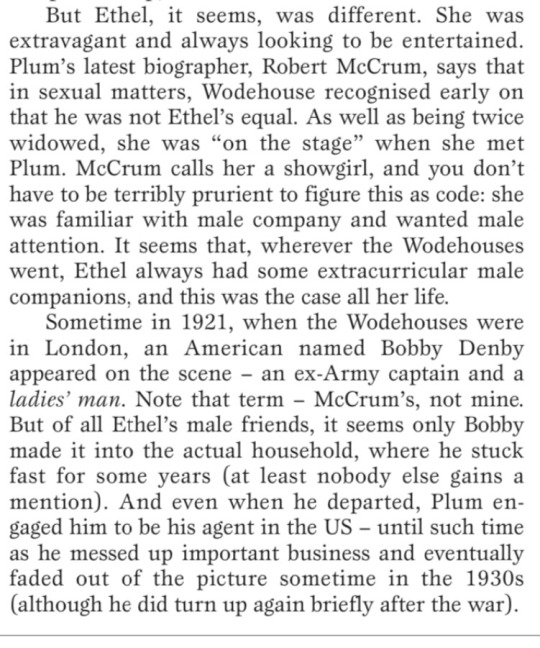
Noel Bushnell, in his 2015 essay "The Rodney Spelvin Theory", suggested that Wodehouse's short story Jane Gets off the Fairway was a way of admonishing Ethel for overstepping with Denby, and it does seem likely that it could have been a way of venting. But from what I've read, it seems clear that Wodehouse was fully aware of Ethel's flirtations, and in fact facilitated and encouraged them. McCrum recounts a sit-down he had with one of them in the early stages of his involvement with the household:
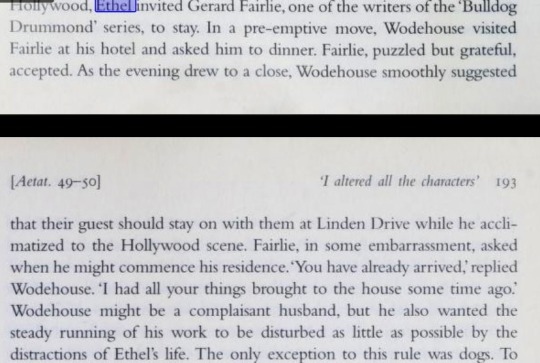
Rodney Spelvin is definitely closer than Baxter to the man Bobby Denby seems to have been; less puritanical middle manager and more ladies' man. (I think it should be noted, though, that Rodney is later rehabilitated through the holy power of golf, and even brought into the family by marrying William's sister Anastasia.)
There must have been a line somewhere in the Wodehouse marriage, because Ethel was furious about Wodehouse's own affair with a chorus girl named Fleur Marsden, which she discovered after finding a receipt for a Tiffany bracelet in the trash. Again, it's not clear what constituted "an affair", but it must have been crossing some boundary if he hid it from her. Wodehouse was introduced to Fleur by Guy Bolton, who laughingly referred to the affair as "Plum's one wild oat", so it may have been sexual, or Bolton may simply have assumed that everyone worked like him.
Considering that both the Jane-Rodney and Baxter-Lady Constance relationships are devoid of sex, I think it's less that Wodehouse "looked the other way", as some have put it, and more that the Wodehouses had an open marriage, only without the sex. If my theory is correct that Baxter reflects Bobby Denby to a certain degree, that would explain both circumstances, the Wodehouse marriage and the Baxter-Lady Constance relationship. Because sex and a full-fledged romantic relationship are so thoroughly off the table for these two fictional characters, it must also have been a firmly understood boundary within the Wodehouse marriage, to the degree that Wodehouse thought it was self-evident that no such relationship could ever exist between Baxter and Lady Constance.
As to Baxter vanishing from the Blandings stories after being a fairly major player from the beginning, I've discussed that elsewhere. Critics have explained this by saying that he was a more realistic character who didn't fit into the farces that Wodehouse wanted to write, but he serves very well in some of the best farces, so I think it's more a combination of factors:
1. A character with his cannot believably be stuck on Blandings forever, and we see that by his last appearance in Uncle Fred in the Springtime, he's moved on, and also moved up in the world by finding employment with a Duke. He won't go lower, either, and there's nowhere higher to take him without giving the character real power.
2. He and Galahad are like oil and water, and Gally really becomes the main viewpoint character after Springtime. They just can't be written in direct opposition, because if Baxter takes a domineering attitude, which he always does, Gally will kick immediately where Ashe, Psmith, Uncle Fred, have all been content to toy with Baxter in ways that extend the plot. Note that in their one shared book, Summer Lightning, Gally and Baxter never speak to one another directly, and they're carefully oriented so they never have reason to concentrate on each other for too long.
3. In one of Wodehouse's diary entries from prison camp (printed in Donaldson's biography), he says that the main Kommandant "thinks everyone a crook--like Baxter". This is the only reference to any of his characters that I've seen in that diary, and it identifies Baxter with a very major player in Wodehouse's personal misery. He finished Uncle Fred just before he and Ethel were captured at Le Touquet, and Baxter never appears again.
However, it's also true that:
4. Bobby Denby was also out of their lives and household at this point, though he popped back up briefly in the 40s. In his final appearance, Baxter is no longer trying to get back into Blandings, and he's only there as someone else's employee. Something about his writing is only half-developed: he suddenly skips out on work to go to a fancy dress ball, with no explanation given for this departure from character until Wodehouse modified the plot for the abridged version. Lady Constance has no reaction to this strange behavior, and finally Baxter is forcibly removed from the plot with knockout drops, taken on very dubious advice from a known impostor. He's absent from the rest of the book, never seen again, and not even mentioned until decades later in Service With a Smile, where we learn briefly that he's working for a millionaire in Pittsburgh. All in all, his deployment is half-hearted, and runs counter to several well-established character traits. Coupled with the fact that there are about five different heavies by the end of the book--it feels like Wodehouse didn't have much inspiration left for Baxter.
Lady Constance has also abandoned her secretary quest in Springtime. In Service With a Smile, she's engaged Lavender Briggs, whom we're told is actually better at her job than Baxter--and thus worse. The sum total of Lady Constance's reaction to her? "Thank you, Miss Briggs." That's it. One sentence. None of the raptures that Baxter used to inspire. There's a new autocrat who makes his way into Lord Emsworth's household through her, in the form of the Duke of Dunstable, but in his case we are told the romance between them is dead and never coming back. And in one book she and the narrator actually forget it ever happened 🤪. She's also willing to be deeply annoyed by the Duke; as soon as he arrives, his presence becomes a negative for both her and Lord Emsworth. Clearly there was something special about Baxter, and by 1939 in our world, that something had vanished. Was that something also present in Wodehouse's own life, a uniquely annoying member of the home who operated with the authority of the female head of household, and could not be directly opposed by the hapless and non-confrontational male? I've begun to think the answer is yes.
#wodehouse#Baxtance#blandings castle#polycule drama of the early 1900s#the small bachelor#a damsel in distress#sorry about the lack of citations on the screencap but I'm kindaaa bedbound and shuffling a ton of caps around on my phone#I'm sure two are from McCrum and Donaldson
4 notes
·
View notes
Text
I’ve talked a lot about Abigale Blackwing and how I characterize her, but not so much about the other Anti-Cipherites… Let’s fix that!
Thurburt Mudget Waxstaff III - a clumsy and extremely passionate journalist and wannabe salesman (Couldn’t sell jack for shit without help from a certain demonic triangle, forever cursed to have only the worst possible ideas for how to pitch a sale). Can be EXTREMELY petty and spiteful, especially when he feels he or his friends have been wronged. Very pathetic, this man is a mess. Also extremely silly, one of the silliest men you will ever meet. The only reason he’s made it this far in life is because his whimsical nature makes his incompetence more endearing rather than annoying… that and his dad is rich. Has a… distant relationship with his father. Was always more of a mama’s boy, but his dad still finances his lifestyle while he tries (and fails) to keep a proper steady job. Only child (derogatory). Incredibly homosexual, never understood other men’s interest in women, was always enraptured by the men in his life. Tries to repress most of these emotions, due to societal pressures and legal restrictions on homosexual acts, but rest assured if he was alive today he’d be whoring it up with damn near any man he could find. Born to be a slightly problematic nepo baby in a giant gay polycule with drama and toxicity levels you could never even dream of, forced to be a failed journalist/salesman in the late 1800s, early 1900s plagued by triangles.
THINGS I ASSOCIATE WITH HIM - hydrangea flowers, rats and mice, snowy weather, jazzy piano music, the color light blue
Horace Broadshoulder - quiet and surprisingly soft spoken. Often used his sheer size as an intimidation tactic against those who have wronged his loved ones. Will not hesitate to punch a motherfucker for the people he cares about. The tough-guy persona easily melts away writhing a few minutes of talking to him, though. He’s a big sweetheart, very considerate and in-tune with his and other’s emotions. A lot of his tough-guy persona was created in response to growing up dealing with intense racism as a mixed race man in the Victorian and Edwardian eras, built in order to protect himself. His biggest dream is starting a family and raising the next generation to be smarter, stronger, and of above all else, kinder and more understandable than the current one. Has a bit of a temper towards strangers, but most of his friends and family have never seen him mad. The ones that have knew he was just trying to protect them (even if they think sending a man to the hospital over one rude comment about Horace’s sister is a bit extreme). Speaking of, Horace grew up with three sisters, one older and two younger. Loves his sisters to death, would give them the moon if he could. Really values family. Jessamine reminds him a lot of one of his younger sisters, gets along very well with her! He and his sisters were raised basically alone by his mother, funded by their wealthy father in secret. His father, as a white man of considerable influence, couldn’t risk being seen having relations with a black woman in a time of anti-race-mixing, so he rarely was in his children’s or his lover’s lives. Horace’s poor mother was head over heels for his father, but his father saw her more as a burden then anything else. Horace hates his father, low key, but would never tell his mother that. Horace is also bisexual, but wasn’t really aware of that till he met a certain pathetic journalist… cough cough…
THINGS I ASSOCIATE WITH HIM - chrysanthemum flowers, the smell of oak wood and freshly baked bread, the color peach
Jessamine Delilah Gulch - takes no shit, very no-nonsense. Raised in poverty and made a name for herself via the traveling western sideshow she joined as a teenager for extra cash. Has much more than “a bit” of a temper. Used to be known as “Trigger-Jolly Jessie” in her small home town due to her habit of “accidentally” shooting people in the leg or hip when they did something that pissed her off. It’s a wonder she never got apprehended for that, actually. Was taught to use a gun at a very young age by her uncle, who raised her along with her aunt. Her father was a drunk and her mother was institutionalized just one year after Jessamine’s birth for “hysteria.” Her uncle (her mother’s brother) and aunt took her in to protect her from her father’s drunkenness, even though they didn’t have a lot of money to spare to raise a child that wasn’t technically their’s. Has a massive respect for her uncle and aunt, but couldn’t stay with them for longer than what was absolutely necessary due to her not wanting to burden them. Always dreamed of becoming a famous singer and actress, but settled for being a sideshow’s sharpshooter in order to make ends meet. Many describe her as “severe” or “frigid,” but she absolutely melts around those she trusts, especially her dearest Abigale. Abbey loves her far more passionately and sweetly than any man could, she’s sure of that! Absolutely a lesbian, probably also on the grey-romantic spectrum too. No one has ever nor could ever catch her heart like Abigale has. She also has a puppy! Her name is Rosie, she was a mutt Jessamine found in her time on the road, and decided to take in. She’s a feisty little thing, but such a sweetheart!
THINGS I ASSOCIATE WITH HER - royston turquoise stone, daffodil flowers, hunting dogs, sherif stars, revolver pistols (specifically the U.S. Cavalry 1873 Henry Nettleton Revolver), the color grass green
Father Tinsley O’Pimm - a drunkard and a former man of the faith with no faith left in him. His family was middle-class and severely religious and suspected him of being gay at a young age, so they sorta forced him into training to be and eventually becoming a priest in order to “fix” him, or at the very least prevent him from doing gay shit. Never knew what he wanted to do when he grew up, so he sorta allowed his parents to set his life up for him without much complaint, even though he really didn’t like being a priest. Is now incredibly bitter and jaded about life in general, and no longer speaks to his family. Took up drinking in secret to ease the agony of living a life that was never truly his, but was eventually found out and excommunicated from the church. Clings desperately to his former-priest status, not because he truly believes in God nor because he liked being a priest, but rather just because he doesn’t know what else he would have been if not that. This man is going through it. Arguably the most sane of the Anti-Cipherites, when he’s sober anyway. Also the oldest, and often feels like he has to wrangle the rest of the society in at times. Extremely starved for love and affection. Discovers a love of gossip while talking to Abigale, as well as his love of men through two particular men in the society… guess his parents were right about one thing. Would never dare act on these emotions under normal circumstances, and starts actually sobering up a bit in order to prevent any “slips” from himself under the influence.
THINGS I ASSOCIATE WITH HIM - pomegranates, candles, golden jewelry, ruby stones, pigeons, the color red
Abigale Blackwing - eccentric, loud, and infectiously passionate. Born to a wealthy couple, her mother died tragically in childbirth, leaving her architect father to raise her alone. She was his world, and he did anything and everything to set her up for the most happy and fulfilling life possible. Crossdressed for much of her adolescence in order to sneak into prestigious engineering schools that did not accept women, backed up by documents her father forged for her. Completely fell in love with machines, wanted to dedicate her entire life to making mechanical marvels the likes of which no one has ever seen before! Youngest of the Anti-Cipherites, and also the most enthusiastic. Besides machinery and mechanics, Abigale also has an interest in fashion, as well as a love of gossip. God, she loves to gossip. She’ll talk your ear off for hours about some juicy new scoop she found out about that day, and when she’s done, she’ll talk your OTHER ear off about her newest invention and how it works. No sense of self-preservation, she’s blown herself up and set herself on fire for the sake of her inventions more times than she can count. It’s a wonder she’s even still alive. No regard for the law, she is ruled by her own wants and that’s it. Very touchy, especially for a woman in the Edwardian era. Always holding or grabbing or patting the shoulder of her friends. Also prone to playfully punching or swatting her pals while joking around, unfortunately also prone to forgetting her strength and accidentally hurting them (“Oh dear, I’m so sorry Thurburt, I hadn’t meant to hit you so hard!” “Oh no no no, that’s quite alright Abigale! You’ve got quite the arm there, haha! Ha… ow…”). Knew from a very young age that she had no interest in men, and a LOT of interest in women. Tried to court a few young women in her crossdressing days, but always felt terribly about having to lie to them about her true identity. When she met Jessamine, she fell completely head-over-heels crazy in love with her after only a few days. Obsessed with that woman, would litterally blot out the sun for her if she asked.
THINGS I ASSOCIATE WITH HER - allium flowers, gears and mechanisms, birds (specifically corvids like crows, ravens, and magpies), the moon, comets, the color purple
#as always feel free to ask for elaboration about anything…. if u want…….#aria ramblings#anti cipher society#anti-cipher society#thurburt mudget waxstaff iii#thurburt mudget waxstaff#Horace Broadshoulder#Jessamine Delilah Gulch#father Tinsley O’Pimm#tinsley O’Pimm#tbob#the book of bill#gf#gravity falls#gravity falls headcanons#headcanon#headcanons#abigale blackwing
29 notes
·
View notes
Note
Kazuma/herlock for ship bingo 👀
YES they have taken over a permanent part of my brain. Despite the hyperfixation shift, they have not moved out. I doubt they ever will.
Bingo-ish and also I am starting to realize the only way to get a bingo is with the free space column. Other routes just aren't as consistent as a group. Okay reconsidered and I'm taking that back but there are more hoops to jump around in others. Anyway.

Details below again.
i'd read a fic by default.
otp x 1000 i don't know how they got there but, despite my published tgaa works being mostly asry and some ot4, these two are actually my tgaa otp. sure, the other pairs i ship only come second or below by a hair-width, but these fuckers take the cake.
the angst. the drama. the grief over ryu. the battle of mansplain manipulate manwife. there is as much drama here as there is comedy.
*t4t gets an asterix because i hc that technically they are "cis" men but neither of them know nor care about the concept of gender. cis-ish men. men who go by he/him because they don't care enough to change. i'm not covering the tile, but they are not binary.
been married for 30 years? are we talking tgaa canon or later because technically tgaa took place in early 1900s soooo easy argument for decades of marriage before death and mainline aa a century later. also they get an old married couple routine three weeks into getting closer so there's that.
free space: no one understand them like each other and that's why they hate being in love with one another at the very least until the inevitable acceptance stage. kazuma is all about keeping his cards in his sleeve. herlock has a whole superiority complex on knowing everyone's intentions while being a closed book that looks open. and they both think this one bitch barged into his life and looked right through his walls?? exquisite.
rotating in my brain like a microwave always.
i have so many headcanons man where do i start. i suppose even the free space part is a headcanon because of how little they interacted in canon. but here is a freebie. they get married but they throw off the engagement literally every day until the wedding over the pettiest reasons. mr. asogi i cannot marry a man who does not appreciate the fine woodwork of a violin. here is your mother's ring back. (they make up in 3 hours)
awwe i love them :) obviously.
part of a bigger polycule asoryuvanlock always and forever my beloved.
fandom doesn't know them like i do they know them a little. but not like i do.
canon did them wrong? YEAH BY NOT HAVING THEM INTERACT. even the courtroom bonuses proved me right about their chemistry. it would be amazing in the main storyline.
#i miss them so so much#GREAT prompt#thank you queen love you queen#light-em-up-benzedrine#alex has answered#ask meme
9 notes
·
View notes